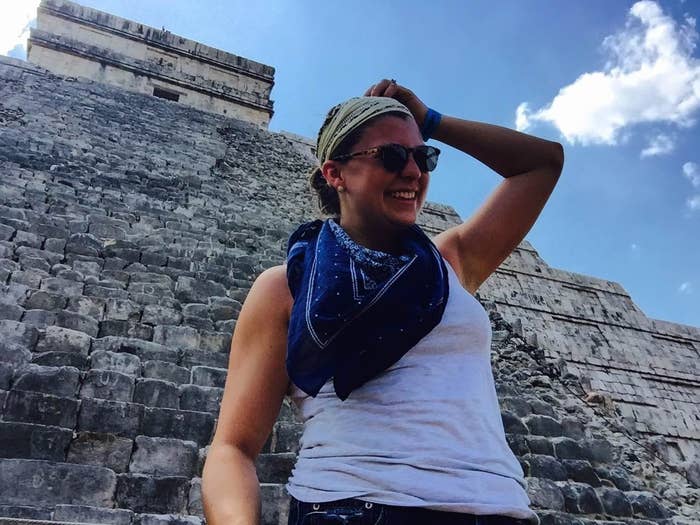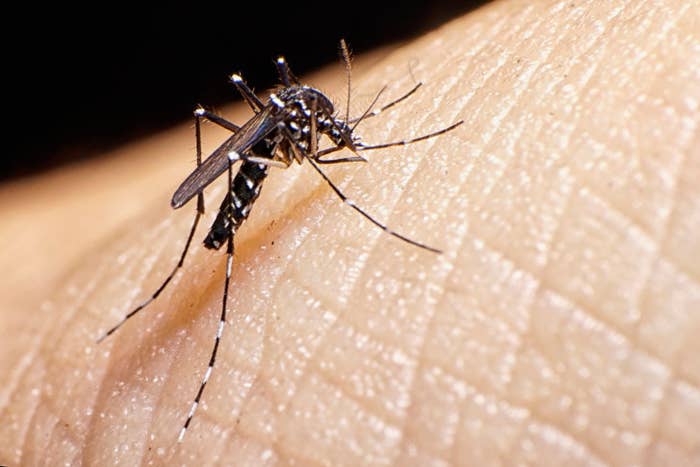
It was supposed to be my mental health gift to myself — five days in Mexico with nothing but a stack of Hemingway books and all the free tequila I could drink. I had never been to the Caribbean before, unless you count Guantanamo Bay, which is hardly a vacation. So one afternoon, I jumped on Expedia, booked the cheapest bundle deal I could find, and started counting the days to touchdown in the Yucatan.
I was going to turn off my phone, do absolutely nothing for five whole days, and forget what the words “caucus” and “Trump” even meant. I did, and it was great — I took tours through the jungle, spending every day outside enjoying beautiful weather. It wasn’t until I boarded my plane in Cancun to head back north that things started to go seriously south.
My apartment door hadn’t closed behind me before I made a mad rush to the bathroom, throwing up every last thing I had put in my stomach in the last 24 hours. I didn’t leave that floor the whole night. Not since my early college years do I remember seeing such hopelessness on the inside of a toilet bowl.

In one brief hiatus, I lifted up my T-shirt to check on what I thought had just been a small heat rash that surfaced a few days into the trip. It had shown up along the right of my back, extending out from a handful of mosquito bites I had picked up along the way. The last I had checked on it, it had seemed relatively tame. Now, it was inching across the front of my stomach and down my legs, stretches of red so dense that they looked almost like angry purple bruises.
Meanwhile, my right eye was inflamed and bright red, almost akin to a busted blood vessel. That, too, had shown up early on in the trip. I blamed it on a clumsy, poking-myself-in-the-eye-with-mascara incident.
I have no idea why it took me so long, but at this point, I finally googled “Zika symptoms.”
That took me to the CDC website. The first three symptoms listed were red eyes, rash, and joint pain. Suddenly the sore back and shoulders I noticed in Mexico didn’t seem so out of place. The nausea, meanwhile, appeared to be a bad case of food poisoning, though an upset stomach is mentioned occasionally as a possible Zika symptom.
The following morning I crawled my way to the doctor’s office. In my dehydrated babble, I said four things: Mexico, rash, joint pain, red eye.
“Ah. You got bit?”
She took one look at the rash — which at that point, had started showing up on my face — and said the magic word: Zika. She was almost positive I had contracted the virus, she said, though I won’t get an official answer until my blood test results come back in up to six weeks.
I was weirdly stunned and weirdly not. My general rule is that if something crazy could happen, my luck probably means it will. But Zika?!
The doctor sat down and filled out a Department of Health form with me. I don’t remember tons of specifics — it was a rough morning — but it had basic information about what country I had visited, how long I had been there, and what symptoms I was showing. After taking two vials of blood, she sent me on my way with nothing but a prescription for rest and fluids. If you're healthy and not pregnant, Zika is far less of a concern than it is for the many women who live in affected countries across Latin America and are now battling fears over the virus. There's even a positive spin: My doctor says now that I've gotten it, I'll have an immunity to it in the future. (This doesn’t mean, by the way, that young women should intentionally contract Zika, as no one really knows how long its effects might be harmful to a developing fetus.)
The CDC called me not long after I left my doctor’s office. "You requested a Zika test?" they asked. "Yes," I said. They ran through several basic questions — was I pregnant, where had I been, why had I been there, was I traveling with anyone, what were my symptoms, did I take any precautionary measures? I asked if I needed to look out for anything. Nope, the CDC guy said. Nothing in particular.
But I'm lucky. I have easy access to a doctor and medical facilities in case this takes a turn. I'm pretty healthy, not pregnant, and not remotely interested in becoming pregnant anywhere in the foreseeable future — and, for that matter, I've got access to birth control methods so that I don't accidentally become pregnant while this thing is in my system, however long that is. All things considered, I have the luxury of shrugging Zika off pretty easily. I was a little more tired than usual, a little achy, but a week into it I’m already feeling loads better. Both my doctor and the CDC told me it’s fine to be around people; as far as my case was concerned, the only way I could transmit the virus was via sex.
But what struck me was the contradicting information, or general lack of information altogether. My doctor told me if I do indeed test positive for Zika, I shouldn’t get pregnant for three years. The CDC, meanwhile, said I would have to wait only eight weeks. How long did the disease stay in my system? Not sure, and scientists don’t even know yet. For how long after this week could I transmit the disease? Unclear. Did I need to quarantine? At first, I was told not to be around pregnant women. Then I was told it was fine, since the disease is only communicated person-to-person via sex.
Compound this with the fact that the CDC is so backed up on testing that I won’t actually know for sure if it’s Zika for six weeks, and I can understand why the disease is scaring people. I’m making jokes about being a statistic, but I can’t imagine if I were pregnant or trying to start a family. And what kind of precautionary measures could I have taken, other than not to travel? I wasn’t in a mosquito-heavy area, though, I admit, I didn’t use bug spray. And some figures say 4 in 5 people who contract Zika don’t even show any symptoms. If you’re a man who travels down south and then goes home and keeps trying to get pregnant with his wife — how would you even know?
Thankfully, for me, the only effect is that I’m probably on one more government watchlist. And I think the tropics and I are taking a break to see other people — my next trip will be 10,000 feet above sea level in the Rockies, where I’ll happily trade mosquitos for grizzlies.
